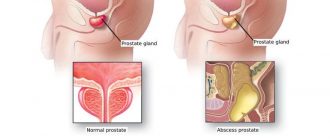Temperature with prostatitis may indicate the development of the disease or attempts by the immune system to fight the infection. However, this symptom may not be associated with this disease, but may appear for another reason. Therefore, before self-medication, it is better to contact a urologist and get advice. Moreover, it does not need to be shot down in every situation.
Dependence on the type of prostatitis
One of the most noticeable symptoms of prostate inflammation in men is fever. However, it can manifest itself differently in different forms of the disease, so it is worth considering separately the cases of acute, chronic and non-infectious prostatitis.
During the acute phase
Temperature with prostatitis in men indicates the development of an inflammatory process. The acute phase is usually divided into 3 types, or stages, depending on the degree of tissue damage.
At the first stage, the temperature of prostatitis may not rise, because the infection has not yet developed sufficiently. Other symptoms may also not appear, making diagnosis difficult.
A low-grade fever (37-38 °C) can be observed already in the second stage. If the immune system does not cope with the infection on its own and no therapy is carried out, it appears 10-14 days after infection. This is evidence of extensive tissue inflammation, and other symptoms may also be observed that suggest this disease. Most often, patients seek diagnosis during this period. Separate therapy to reduce it is not carried out, only in cases of serious deterioration in well-being.
Fever or chills are observed at the last stage, when the inflammatory process covers almost the entire organ. Indicators can reach 39-40 °C.
High temperature with prostatitis during this period can seriously harm the entire body and life of the patient, so such indicators are brought down with the help of antipyretics.
In case of chronic course
The temperature in chronic prostatitis can rise to 37 °C. This usually occurs during the period of exacerbation of the disease, the rest of the time the indicators remain normal. It is not intended to combat this symptom; most often, doctors prescribe antibiotics to eliminate the cause – pathogenic bacteria. If the treatment results are positive, the symptom disappears within 3-5 days.
With non-infectious origin
Abacterial prostatitis is characterized by low temperature (up to 37 °C). The reason for this is its origin, namely stagnant processes. They do not provoke immunity, so a feverish state does not occur, because this will not contribute to recovery.
However, stagnation of prostatic secretion is a convenient environment for the proliferation of bacteria. Therefore, if they enter the prostate gland from the outside or from neighboring tissues and organs, a sudden appearance of fever and an exacerbation of other symptoms may occur.
In the absence of a positive effect of treatment, the disease can also enter a chronic stage, in which fever can be observed during periods of exacerbation.
Recommendations for reduction
Fighting a fever is not necessary in all cases. Recommendations on how and when to do this:
- Attempts to reduce fever will only have a short-term effect. To get rid of a symptom permanently, the cause must be treated.
- The temperature of 38 °C does not require reduction. These are the immune system's attempts to fight infection. It is worth continuing to take the prescribed antibiotics. It is necessary to use antipyretic drugs only if the indicator further increases.
- It is advisable to drink more fluid. This helps both as an antipyretic and to normalize urination. You should not drink coffee and alcohol; weak tea, fruit juice or compote, still mineral or plain water, vegetable and fruit juices are suitable.
- If the readings are 39 °C or higher, you need to take antipyretics, but you don’t need to experiment with their choice. It is worth contacting your doctor, he will prescribe a suitable drug. If this is not possible, it is better to take the usual medications (Paracetamol, Aspirin, Ibuprofen).
- If you have fever or chills, it is advisable to stay in bed.



